Make America Great Again. Finish the Job. Everyone’s Invited. Make America Normal Again. Declare Your Independence.
With the 2024 presidential election less than nine months away, campaigns and debates are in full swing and controversies are hitting the general public from all sides.
On one hand, former President Donald Trump is in the midst of grueling legal battles: from a $355 million civil-fraud ruling to his removal from presidential ballots in Colorado, Maine and Illinois. Due to his indictments, the flurry of discourse surrounding his eligibility to run in the upcoming election has rapidly increased.
“There’s conclusive evidence that Trump has done all of the things he’s being questioned for. The fact that it’s still a question of whether or not he will actually get banned from running is insane,” junior Felicity Jackson said. “If you’re being actively investigated for crimes against your country, I don’t think you should get to run to be the head of [it].”
On the other hand, the contrasting probable option in the election — current President Joe Biden — isn’t out of the woods in the public’s eye either. At 81 years old, he is the oldest person to serve as United States president, prompting voters to question his mental and physical ability to serve another term.
“He’s the same age as my grandparents. I don’t know about [anyone else], but I wouldn’t want my grandpa running for president: [he] can’t even learn games. I’m not thrilled about the choices and I feel like I’m not the only one. A lot of people are upset with both the polarization of the parties and the fact that the US is stuck in this bipartisan system,” Jackson said.
Either way, the blatant pros and cons to all candidates are ubiquitous— and common knowledge — to almost the entirety of the teenage demographic. In an era of rapid communication and instantaneous news updates, Gen Z has taken the realm of politics by storm. Due to this, society has an obligation to maintain an active political sphere for students through a multitude of pathways that ensure a future during which the potential of increased advocacy is realized.
Though our generation is the youngest group actively involved in government and current affairs, studies have proven that our knowledge and capacity regarding real-world issues are on par, if not superior, to older age groups. While individuals getting involved in the world around them at an early age may seem fine, it presents an issue that Gen Z knows all too well: navigating the harsh truths of reality too early in their lives.
Growing up with the world at our fingertips has brought several burdens upon not only this generation, but the next; keeping up with trends, beauty standards, constant comparison and the dangers of cyberbullying have plagued the lives of our youth for as long as they’ve known. One of those burdens is having an awareness of hostility within the politics and media.
“Media tends to push certain things out, depending on what you look at. If you see one political view or video once, it’s likely that the algorithm is going to push it out more,” sophomore Ryan Shabani said. “Sometimes social media can be biased and is very one-sided, but it can help open up people’s views to things they wouldn’t know or see otherwise.”
There is an upside and a downside to everything; platforms like Instagram, X, Facebook and Youtube may lead young susceptible minds down into an echo chamber, initiating them to mature faster, but they also expose them to issues both domestically and globally.
Take, for example, the Israel-Hamas war. Producing “some of the most visceral and engaging content from the frontlines,” as war correspondent David Patrikarakos said, appeals to an audience’s emotions; and with the engagement, the likes, reposts, shares and comments come racing in. Though the dispute has continued for over 75 years, the conflict’s popularity has reached unprecedented heights — further emphasizing the power of an online presence.
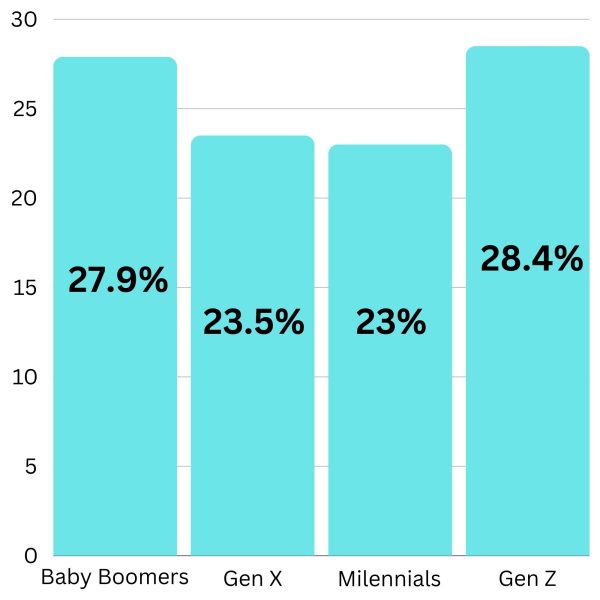
However, to fully understand, the true implications of political engagement on youth, we must look past the jugular social media, and onto other aspects of life that influence one’s encounters and experiences: namely, generational knowledge.
The first words we learn to say, the first faces we learn and the first belief we form is that of the people who raised us. Likewise, when it comes to picking a party or developing an opinion on a polarizing topic, our first inklings of thought enter our subconscious from our surroundings.
“[My views] are similar to that of my parents. By third grade, my parents would talk about elections and that led me to develop certain political views. When you’re around someone [who] talks about having a certain view, you tend to get that view as well. That’s where a lot of people’s opinions come from,” Shabani said.
While around 70% of the teenage population display a similar belief system to their parents or guardians, like Shabani, that is not the only method of influence that surroundings and family dynamics have on a child. Over one-fifth of US teens identify as more liberal than their adults while seven percent consider themselves more conservative.
“My family’s views [stem] from Islamic beliefs, because I’m originally from a theocratic country, so our entire country is based off of them. Up until the age of eight, I was following Islam,” junior Neeka Naghibi Harat said. “[But now], I’ve definitely strayed away from it, and I’m super secular. [My beliefs stem from] more of how I feel and how I want to be treated versus what I wanted other people to see of me.”
The plethora of methods of forming views and obtaining information has resulted in Gen Z as a whole, being a diverse pool of voices and backgrounds who’ve begun leaving their mark on the world. Individuals such as environmental activist Greta Thunberg, U.S. representative Maxwell Frost and educational activist Malala Yousafzai have been knocking down the doors to change and the remainder of their age group has without a doubt been following along.
At West, methods have been utilized to keep the discussion going — conversations we have with our peers foster critical thinking, open mindsets and healthy discourse. These talks are everywhere: facilitated debates in class, small chats with friends at lunch and in clubs like Diplomacy Club and Speech & Debate.
“There’s a lot of diversity here [at school], which is good and bad. [Bad] because it can lead to a lot of conflict, but [good because] you also see new ideas, as long as when you’re sharing these ideas, no one’s taking it personally and people are keeping an open mind. It just depends on who you surround yourself with,” Naghibi Harat said.
Though students are taught from neutral, bipartisan perspectives, courses such as AP United States History and AP United States Government offer a forum for this sort of discourse. Classes that promote discussion for students on the political sphere prove to be exponentially greater to a student’s comprehension than simply reading or lecturing.
“In [AP US History], we were talking about capitalism and alternatives to it. I thought that was very interesting because I got to share my opinions, and I got to hear the opinions of my classmates and why they believe that. I get to argue against it and they get to do the same for my beliefs, and I think it’s fun,” senior Will Brown said. “ It’s good to start getting high schoolers interested in what’s going on. When we start talking about politics, I get a lot more engaged. A lot of [the] time, everyone has an opinion on politics and it’s [easy] to engage with students over it.”
The skills students gain from being exposed to politics in a healthy, structured manner extend to almost every aspect of life. Not only does it educate the future of governmental systems on the happenings in the status quo, it builds a mindset of commitment to the world and the problems we want fixed.
“[School] helps you think critically. That is especially the goal of upper-level history classes. If you can think critically, that is half the battle to voting because then you just have to analyze how the people you vote for will affect policies,” Brown said.
Critical thinking skills are invaluable in any stage and in any aspect of life. It is the driver of change, innovation, solutions and overall growth — even if students are not necessarily overly passionate about this particular subject.
All in all, when Gen Z takes the reins on the handling of our world, the burden they’ve initially been dealt has transformed into the reason they could shift the derailing of the national government as we know it. Generationally, society is expected to avoid political conversation in order to suppress the controversy that’s bursting at our country’s seams; however, with our generation, these discussions are the best way to keep the future of the world informed, involved and instrumental to the future of our political landscape.

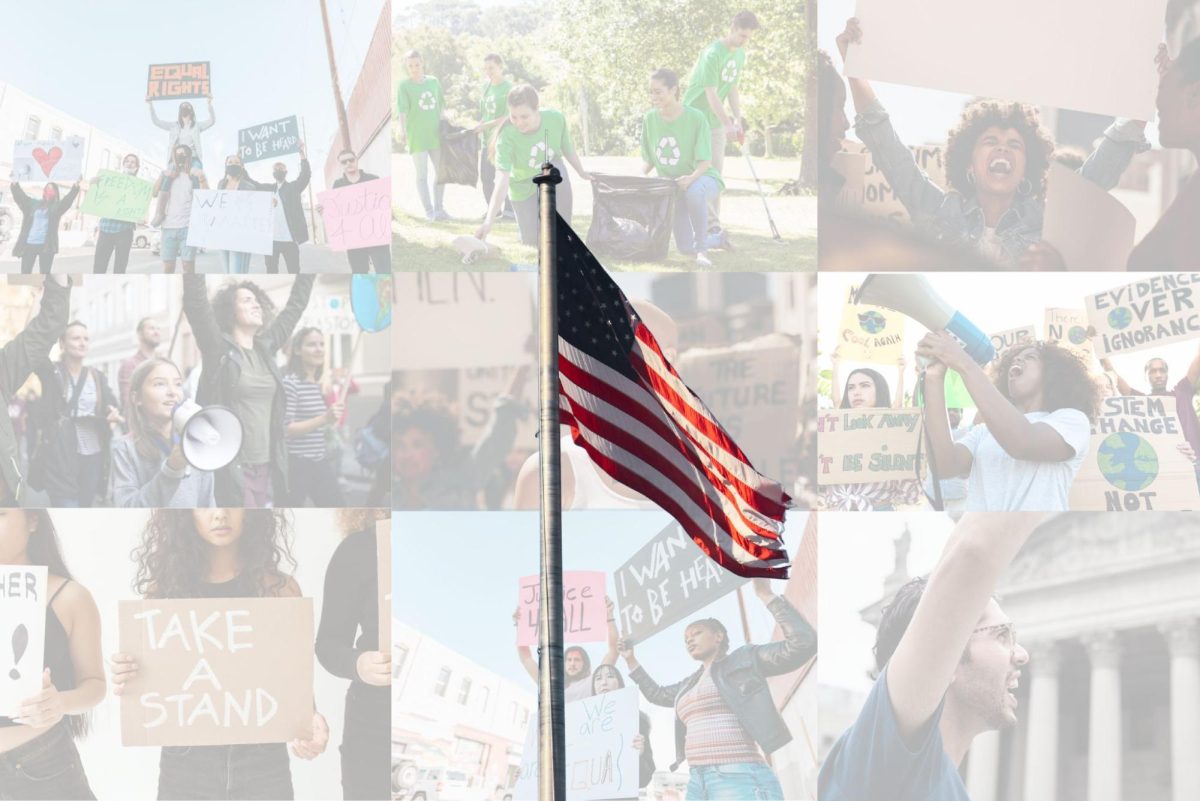
![Leaning on the podium, superintendent Melissa Schneider speaks to Parkway journalism students during a press conference. Schneider joined Parkway in July after working in the Thompson School District in Colorado. “My plan [to bond with students] is to get things on my calendar as much as possible. For example, being in [classes] is very special to me. I am trying to be opportunistic [meeting] kids [and] being in [the school] buildings. I have all the sports schedules and the fine arts schedules on my calendar, so that when I'm available, I can get to them,” Schneider said.](https://pwestpathfinder.com/wp-content/uploads/2025/09/IMG_5425-1200x943.jpeg)

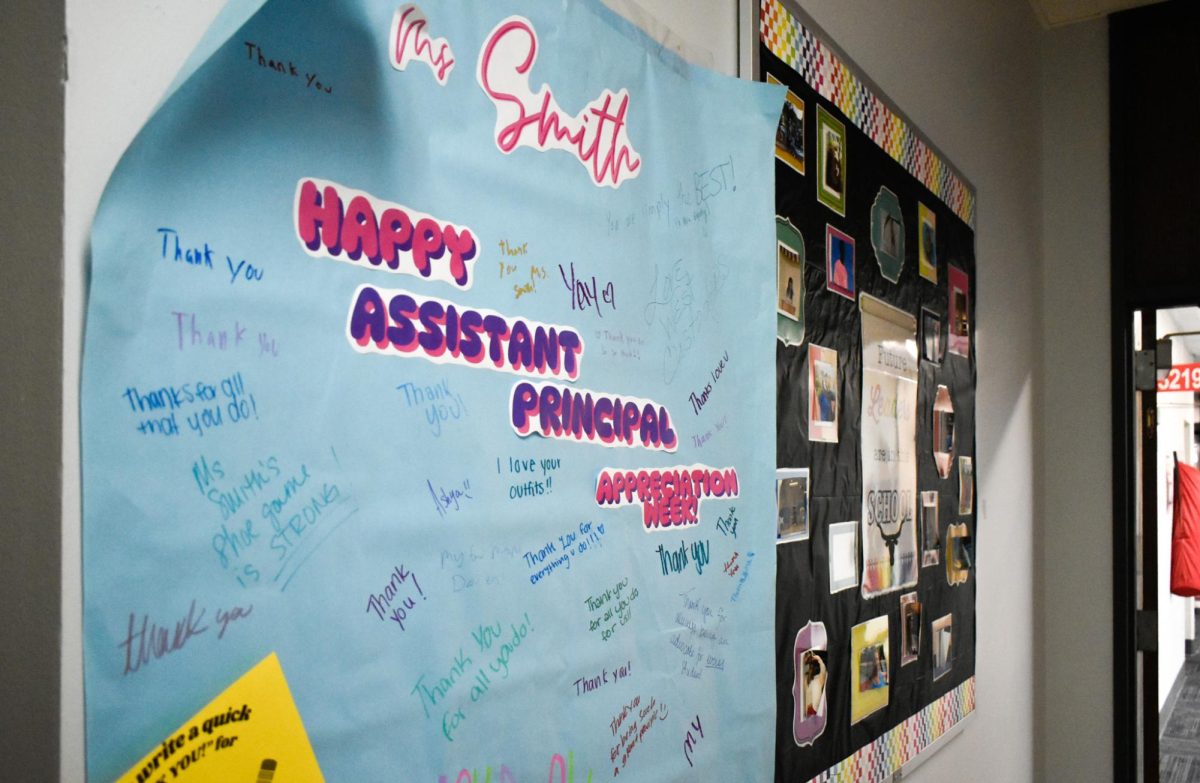
![Red, white and blue, the American flag holds the values of our democracy. The fight that we once endured has returned, as student journalists and senior correspondents across the country are losing their voices due to government control. “[Are] the White House and [the] government limiting free speech [and] freedom of the press? Yes [they are],” chief communications officer of the Parkway School District and former journalist Elisa Tomich said.](https://pwestpathfinder.com/wp-content/uploads/2025/03/Untitled-design-14.jpg)
![A board in the Parkway West counseling department displays pennants of selective universities. With a wide range of students interested in attending, it’s important that these schools have clear priorities when deciding who to admit. “[Washington University] had the major that I wanted, psychology, philosophy, neuroscience. That's a holistic study of the brain, and [WashU is] the only college in the world that offers that. That's the main reason I wanted to go; I got into that program,” senior Dima Layth said.](https://pwestpathfinder.com/wp-content/uploads/2025/02/Flag-1.png)
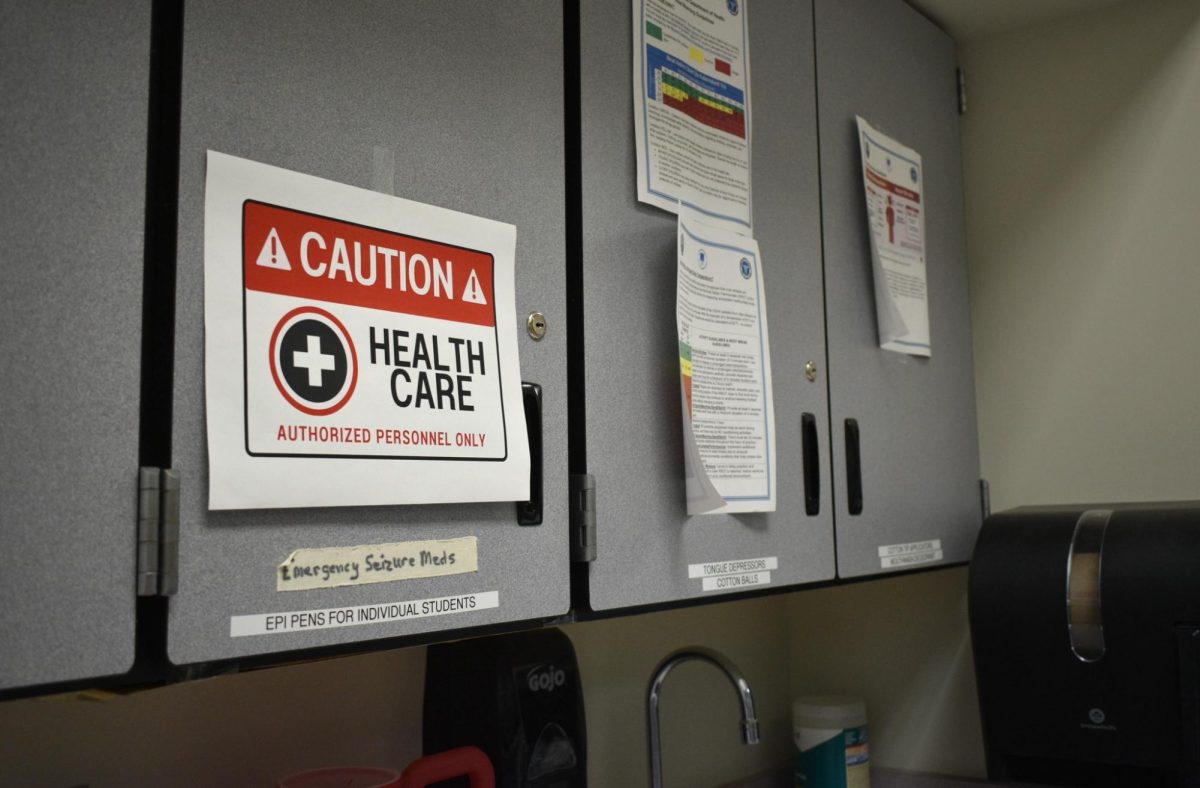
![Within the U.S., the busiest shopping period of the year is Cyber Week, the time from Thanksgiving through Black Friday and Cyber Monday. This year, shoppers spent $13.3 billion on Cyber Monday, which is a 7.3% year-over-year increase from 2023. “When I was younger, I would always be out with my mom getting Christmas gifts or just shopping in general. Now, as she has gotten older, I've noticed [that almost] every day, I'll open the front door and there's three packages that my mom has ordered. Part of that is she just doesn't always have the time to go to a store for 30 minutes to an hour, but the other part is when she gets bored, she has easy access to [shopping],” junior Grace Garetson said.](https://pwestpathfinder.com/wp-content/uploads/2024/12/DSC_0249.JPG-1200x801.jpg)
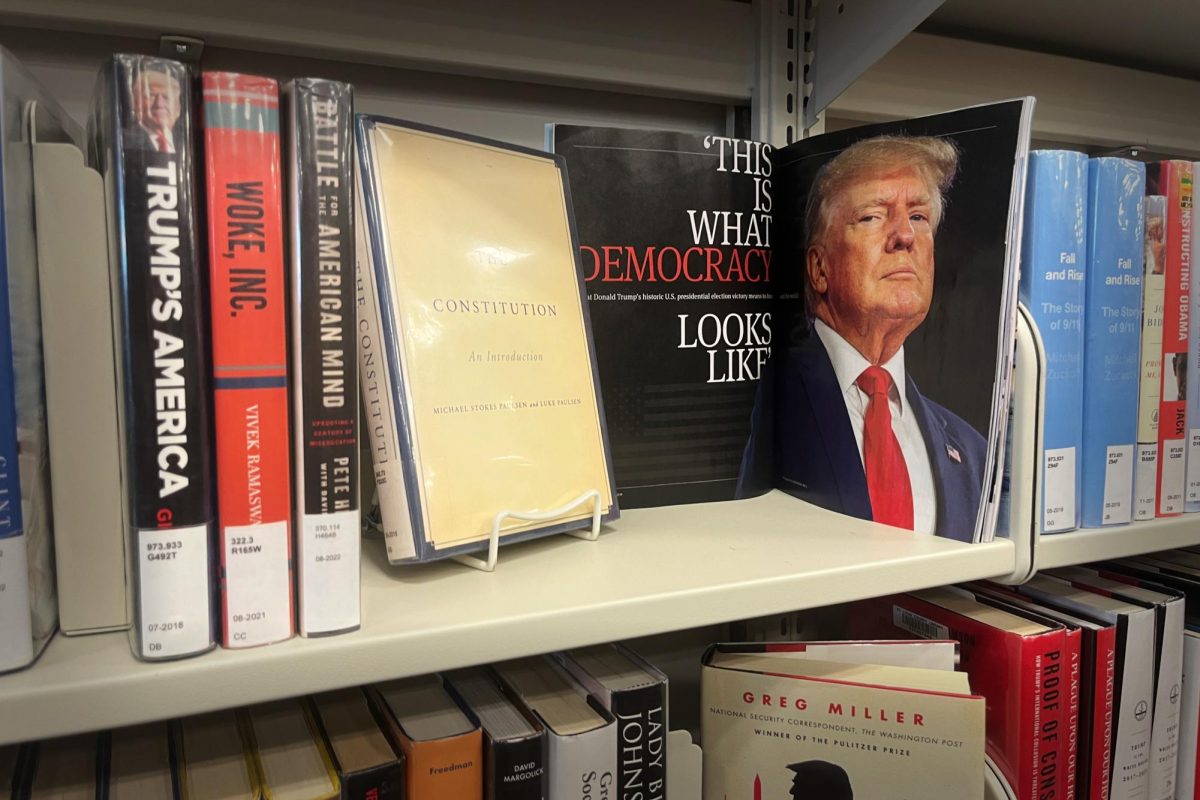
![Senior Sally Peters stands in the history hallway, contemplating her choices in the 2024 United States and Missouri elections on Nov. 5. As a member of Diplomacy Club, Peters has discussed key candidates and issues in contemporary American politics. “[As students], we're starting to become adults. We're realizing how much the policies that are enforced and the laws that make it through the House and Senate are starting to affect us. [Opportunities such as] AP [U.S.Government] and Diplomacy Club [make elections feel] a lot more real,” Diplomacy Club vice president and senior Nidhisha Pejathaya said.](https://pwestpathfinder.com/wp-content/uploads/2024/10/Flag-1-1.png)
![Mounting school pressure can leave many students overworked and overstressed. Schools must give students the necessary resources to help assuage student mental health issues and prevent the development of serious crises. “The biggest thing [schools] can do [to protect student mental health] is offer more time [to do work], like a study hall, or offer more support from teachers so that students don't feel stressed out and can get help in areas that they need,” senior Bhavya Gupta said.](https://pwestpathfinder.com/wp-content/uploads/2024/09/unnamed-4.jpg)
![Focused on providing exceptional service, sophomore Darsh Mahapatra carefully cleans the door of a customer’s car. Mahapatra has always believed his customers deserve nothing less than the best. “[If] they’re trusting us with their car and our service, then I am convinced that they deserve our 100 percent effort and beyond,” Mahapatra said.](https://pwestpathfinder.com/wp-content/uploads/2025/10/DSC_0018-1200x800.jpg)
![Sophomore Aleix Pi de Cabanyes Navarro (left) finishes up a soccer game while junior Ava Muench (right) warms up for cross country practice. The two came to Parkway West High School as exchange students for the 2025-2026 school year. “The goal for the [exchange] program is to provide opportunities for both Parkway students and our international exchange students to learn about other cultures, build connections and become confident, capable, curious and caring — Parkway’s Four C’s — in the process,” Exchange Program Lead Lauren Farrelly said.](https://pwestpathfinder.com/wp-content/uploads/2025/10/Feature-Photo-1200x800.png)
![Gazing across the stage, sophomore Alexis Monteleone performs in the school theater. The Monteleone family’s band “Monte and the Machine” has been releasing music since 2012, but Alexis started her own solo career in 2024 with the release of her first single, Crying Skies. “My whole family is very musical, [and I especially] love writing [songs with them],” Monteleone said.](https://pwestpathfinder.com/wp-content/uploads/2025/09/DSC7463-1200x798.jpg)

![Leaping through the air, senior Tyler Watts celebrates his first goal of the season, which put the Longhorns up 1-0 against the Lafayette Lancers. Watts decided to play soccer for West for his last year of high school and secured a spot on the varsity roster. “[Playing soccer for West] is something I had always dreamed of, but hadn’t really had a good opportunity to do until now. It’s [really] fun being out [on the field], and I’m glad I decided to join the team. It’s just all about having fun with the boys and enjoying what time we have left together,” Watts said.](https://pwestpathfinder.com/wp-content/uploads/2025/09/DSC_1951-1200x855.jpg)
![Junior Fiona Dye lifts weights in Strength and Conditioning. Now that the Trump administration has instituted policies such as AI deregulation, tariffs and university funding freezes, women may have to work twice as hard to get half as far. "[Trump] wants America to be more divided; he wants to inspire hatred in people,” feminist club member and junior Clara Lazarini said.](https://pwestpathfinder.com/wp-content/uploads/2025/05/Flag.png)
![As the Trump administration cracks down on immigration, it scapegoats many immigrants for the United States’ plights, precipitating a possible genocide. Sophomore Annabella Whiteley moved from the United Kingdom when she was eight. “It’s pretty scary because I’m on a visa. When my visa expires next year, I’m not sure what’s going to happen, especially with [immigration] policies up in the air, so it is a concern for my family,” Whiteley said.](https://pwestpathfinder.com/wp-content/uploads/2025/05/DSC_0077-7copy.jpg)
![Shifting global trade, President Donald Trump’s tariffs are raising concerns about economic stability for the U.S. and other countries alike. “[The tariffs are] going to pose a distinct challenge to the U.S. economy and a challenge to the global economy on the whole because it's going to greatly upset who trades with who and where resources and products are going to come from,” social studies teacher Melvin Trotier said.](https://pwestpathfinder.com/wp-content/uploads/2025/05/MDB_3456-1200x800.jpg)

![Pitching the ball on Apr. 14, senior Henry Wild and his team play against Belleville East. Wild was named scholar athlete of the year by St. Louis Post-Dispatch after maintaining a high cumulative GPA and staying involved with athletics for all of high school. “It’s an amazing honor. I feel very blessed to have the opportunity to represent my school [and] what [it] stands for,” Wild said.](https://pwestpathfinder.com/wp-content/uploads/2025/05/unnamed-6-1200x714.jpg)

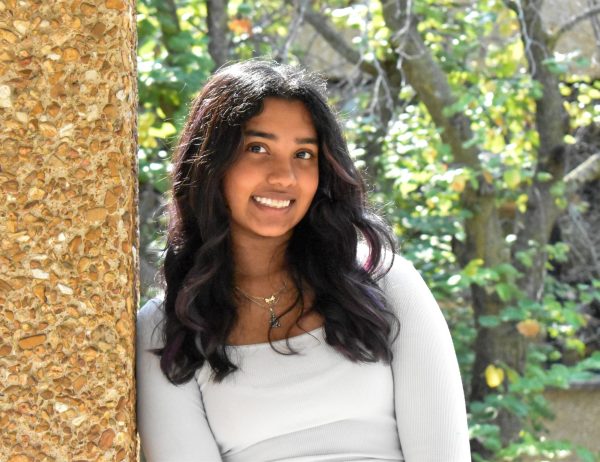
Will Gonsior • Mar 1, 2024 at 9:44 am
I love this Triya!!!
I think a lot of young Dems don’t realize how hostile the generations above them are to progressivism. The nation is increasingly comprised of independent voters who hate the rush to the wings of each party, which is how Biden got himself elected.
This article gets at the root causes of political trends and is so informative. So good.